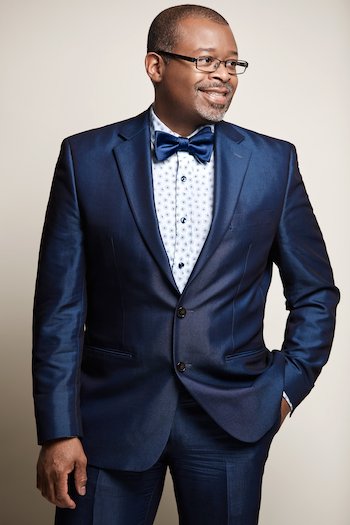by Jarrett Hoffman

Perhaps that’s especially true when it comes to Chava’s Daughters Speak by James Lee III (left). Its premiere in May 2021 at New York City’s 92nd Street Y was presented virtually, with only a limited in-person audience due to the pandemic. And what was to have been the second performance, in Boston last year, was canceled at the last minute when soprano Susanna Phillips developed laryngitis.
That brings us to tomorrow, Tuesday, March 28, when the piece will receive that long-awaited second hearing — its first in front of a full audience — as part of a Cleveland Chamber Music Society concert at Disciples Christian Church. Two of the three performers are holdovers from the premiere: clarinetist Anthony McGill and pianist Myra Huang, who will be joined here by soprano Elena Perroni. Tickets are available here.
Of course, churches are ubiquitous in classical music, and the location is always particularly fitting for sacred music, a frequent genre of exploration for Michigan native and Morgan State University professor James Lee III. Chava’s Daughters Speak is a five-song cycle that draws its text from she: robed and wordless, a collection of poetry by Sister Lou Ella Hickman of the Incarnate Word and Blessed Sacrament in Corpus Christi, Texas. The volume aims to illuminate the inner lives of women of the Bible, some of whom are voiceless or even nameless.
“‘What is not said is just as important as what is said in the text,’” Hickman said during a recent telephone interview, recalling the words of one of her professors at St. Mary’s University in San Antonio, where she earned a master’s degree in theology with a specialty in scripture studies. “I took that greatly to heart, and that gave me a kind of springboard to start asking the text questions about women.”
Speaking of “what is not said,” how about poetry itself, often that most spare of forms? And how about Hickman’s own personal style? “Brevity is my strong point,” she said. “One of the things that I am very keen on is respecting the imagination of my reader. Now, also that’s my weak point, because if I don’t give enough in the poem, they’re going to say, ‘huh?’”
Not that there isn’t also the good kind of huh in poetry — as in, as Hickman said, “I have to re-read, and ooh, now I understand.” But when it’s that other kind? “The person has no clue and walks off,” she said. “That’s my responsibility. I need to give enough to create a story, but I don’t want to give so much that it will insult my reader’s intelligence.”
That wasn’t the only balancing act involved in writing her book. Hickman noted that she was very conscious of employing poetic license. “That’s just part of the nature of poetry, to help the storyline along a bit,” she said.
Somewhere else on the spectrum of adherence to a piece of source material: running roughshod over it. “As I was doing my research, I had a very difficult time reading material that obviously does not respect the text,” she said. “I’m a big movie buff, and I’ve watched a lot of religious movies related to the Bible — and sometimes I just go, ‘you’re kidding.’”
On the other hand, it’s not always worth the fight to be correct — especially when a certain detail is so embedded in the general knowledge of the public. “I was aware that I shouldn’t try to correct some areas of popular knowledge,” Hickman said, pointing to the idea that there were three wise men in the Gospel of Matthew, when in actuality no number is specified. “People might not get it anyway if they’re not into biblical scholarship.”
(That’s not to say that Hickman claims to always be the perfect scholar. “There are a lot of details in the Bible that people tend to skip over, and I know I’m just as guilty of that as anybody,” she said.)
Moving on from the writing process, I asked Hickman how her text is affected by Lee’s music — but she won’t be able to answer that question until after Tuesday evening, which will be her first time truly hearing the piece. “We had a kind of community party here for that first concert when it was streamed, but it was in a large room, and I’m a bit hard of hearing even with my hearing aids. So I did hear it, but I didn’t hear it.”
At Tuesday’s concert, Hickman will not only get to finally take in this piece — and hear what has become her libretto — but will also participate in a pre-concert conversation with Eric Charnofsky to help illuminate the work for others. “He’s going to ask me a few questions — I already warned him that if he gives me thirty minutes, I’ll take two hours,” she said, laughing. “Even though I’m pretty much an introvert, I get very extroverted when it comes to my ladies.”
Published on ClevelandClassical.com March 27, 2023.
Click here for a printable copy of this article



